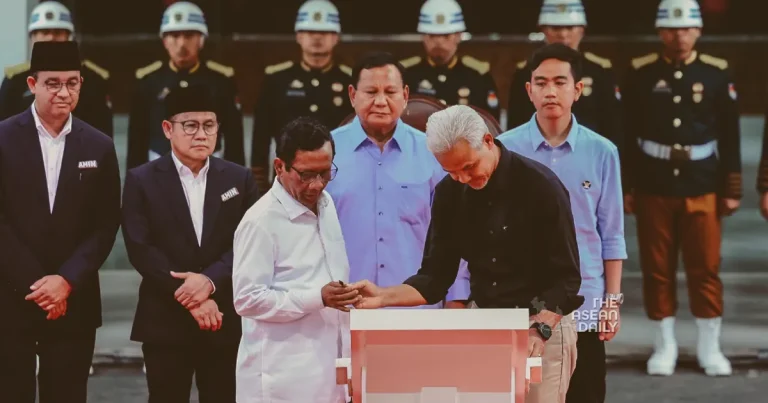21-3-2024 (JAKARTA) Indonesia’s political landscape has been thrown into upheaval following the shock announcement by the country’s electoral commission declaring controversial defense minister Prabowo Subianto the winner of February’s hotly-contested presidential polls. However, the official results were swiftly rejected by rival candidates alleging widespread fraud.
Former Jakarta governor Anies Baswedan and ex-Central Java governor Ganjar Pranowo have vowed to legally challenge what they denounce as a rigged election before Indonesia’s highest court. This dramatic development has plunged Southeast Asia’s largest democracy into an electoral crisis just months after the historic February 14th vote – the nation’s fifth direct presidential election since the 1998 Suharto dictatorship’s downfall.
The 72-year-old Subianto, a former special forces general with chequered human rights ties to past authoritarian regimes and incumbent President Joko Widodo, emerged as the apparent frontrunner on polling day itself. Unofficial tallies from agencies showed him holding a substantial lead over his rivals.
This was formalised on Wednesday when the General Election Commission (KPU) declared Subianto the official victor with 58.6% of votes, comfortably ahead of Baswedan’s 24.9% and Pranowo’s 16.5%.
However, both runners-up swiftly cried foul, citing widespread irregularities before, during and after the electoral process marred the results’ credibility. Key grievances include Widodo openly campaigning for Subianto – seen as unethical for a neutral incumbent – and the alleged misuse of state welfare funds to curry voter favour.
Legal concerns were also raised over the Constitutional Court’s prior decision permitting Subianto to controversially name Widodo’s son as his running mate despite not meeting the age requirement. The court’s former chief justice is Widodo’s brother-in-law, fuelling claims of improper partisan influence.
While analysts suggest the fraud allegations face an uphill battle overturning Subianto’s commanding win mirroring pre-poll predictions, Pranowo’s lawyer Todung Lubis stressed examining procedural integrity transcends merely disputing the outcome itself.
Election challenges must be lodged within three days, with a ruling due by May 7th. However, the former chief justice’s mandatory recusal over conflicts of interest reduces the nine-judge panel to just eight members hearing any cases.
The new president will be sworn in on October 20th, with a fortnight to assemble a cabinet. But Subianto’s rise, despite being Widodo’s former bitter rival in 2014 and 2019, cements an extraordinary political realignment casting a long shadow over Indonesia’s democratic credibility.
Once feared for alleged human rights abuses as a military commander under Suharto’s iron-fisted rule, the uber-wealthy Subianto now styles himself as Widodo’s anointed successor to continue his populist policies. This stark contrast between the pair’s vastly divergent backgrounds underscores Indonesia’s complex political realities.
As allegations of electoral manipulation persist, all eyes are on the judiciary to uphold Indonesia’s democratic tenets amid the gravest crisis facing the world’s third-largest democracy since the Reformasi era began 25 years ago.




